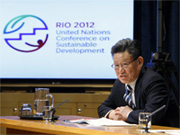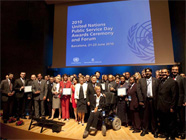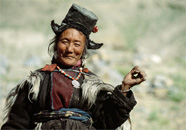DESA News
Volume 15, No.6 - June 2011
Feature articles

“I believe that Rio+20 is one of the most important events of this decade. It is an event for the whole world; it is about tomorrow, about the future. And sustainable development should be our common future. History has given all of us an opportunity to make a difference. Let us do it, together,” says Sha Zukang, Secretary-General of Rio+20, in an exclusive interview.
A career diplomat with extensive experience in multilateral organizations and international conferences, Sha Zukang has been the Under-Secretary-General for DESA since 2007. In addition, Mr. Sha serves as Secretary-General of the 2012 UN Conference on Sustainable Development. Exclusive for DESA News, Mr. Sha shares his experience, vision and hopes as he leads the work culminating in this milestone event taking place in Rio de Janeiro, Brazil on 4-6 June 2012.
What is your vision as Secretary-General of the 2012 UN Conference on Sustainable Development?
“I am a strong advocate of sustainable development and I think, if there is a future for our civilization, it will be through achieving sustainable development across the globe.
As a conference dedicated to sustainable development, I hope Rio+20 will re-launch our world on a sustainable trajectory. That, in short, is my vision.”
What message would you like to convey to governments and organizations around the world, as we prepare for Rio+20?
“I believe that Rio+20 is one of the most important events of this decade. It is an event for the whole world; it is about tomorrow, about the future. And sustainable development should be our common future. History has given all of us an opportunity to make a difference. Let us do it, together.
Rio+20 can be captured in 1, 2, and 3:
– One focused political document on the outcome;
– Two themes – a green economy in the context of sustainable development and poverty eradication and the institutional framework for sustainable development; and
– Three objectives – renew political commitments, assess gaps in implementation and identify new and emerging challenges.
Overall, I would like to see governments and organizations produce two kinds of results – at the political level, renewing their political commitment to sustainable development; at the action level, launching concrete initiatives in support of implementation. These initiatives could be country-led, supported by multi-stakeholders; or led by UN organizations; or by business and civil society.
Rio+20 should be a milestone event, with broad participation at the grass root level. We owe it to ourselves and to future generations.”
What are the chances for success in Rio? Are you optimistic?
“A large international conference like Rio+20 is often a difficult and complicated process, because it is seeking to address broad, inter-linked challenges. But I am optimistic. I see enthusiasm and passion for Rio+20 on the rise. Governments are becoming more engaged. They are setting up national coordination committees or task forces. Businesses are also engaged. They have set up a dedicated mechanism for Rio+20. And civil society groups are active. Many are preparing to launch initiatives in the lead-up to Rio or at Rio.
Equally important, Rio+20 offers a timely opportunity to take sustainable development forward. Rio+20 can, and I hope, will live in history as an event that provided the momentum to re-launch the world on the pathway to sustainable development.
While gaps remain on how to proceed, Governments agree that the current international environmental governance is fragmented and there is need for a better balance between governance for the three pillars of sustainable development. While there is concern over green economy, in the area of trade, aid and capacity building, countries agree that a green economy in the context of sustainable development and poverty eradication can be an important avenue to accelerating sustainable development.”
What in your view are the new challenges?
“During preparatory discussions, delegates identified a number of new, emerging challenges.
Though many are long-known challenges, they have taken on new dimensions. One example is the need for enhancing disaster preparedness, in view of the increased frequency and severity of natural disasters.
Others include energy (energy access, energy efficiency, renewable energy), water (water stress and shortage), land degradation (soil loss), population dynamics, urbanization, sustainable agriculture, ocean and fisheries (the blue economy) and others.
I think Rio+20 will need to address these new challenges. Agreement is needed on measures and commitments that can accelerate implementation in meeting them.”
How is your job as Conference Secretary-General?
“Not easy. It is hard work, but I am not afraid of hard work. I do work hard. However, there are lots of frustrations. Lack of funding is an important one.
Despite frustrations, I also have a strong team working with me and supporting me, which makes this job more enjoyable.”
For more information:
The 2012 UN Conference on Sustainable Development, Rio+20: http://www.uncsd2012.org/rio20/
Sha Zukang, Secretary-General of the 2012 UN Conference on Sustainable Development and Under-Secretary-General of DESA: http://www.un.org/en/development/desa/usg/index.shtml

Over 600 participants are expected to attend the 2011 UN Public Service Day, Awards Ceremony and Forum on 20-23 June. With a focus on “Transformative Leadership in Public Administration and Innovation in Governance: Creating a Better Life for All”, the event will feature workshops, an exhibition and celebrate excellence in public service delivery.
Taking place in Tanzania’s largest city Dar es Salam, this is the first time the UN Public Service Awards (UNPSA) will be commemorated concurrently with Africa Public Service Day. To mark this special event and leading up to the Awards Ceremony on 23 June, a series of capacity-building workshops and a ministerial roundtable will also be held at the Mlimani City Complex.
This global event is managed by DESA’s Division for Public Administration and Development Management (DPADM), under the leadership of its Director, Haiyan Qian. DPADM organized the Awards Ceremony and Forum in collaboration with the African Union Commission (AUC), the President’s Office of the United Republic of Tanzania, hosting the event, and in partnership with UN Women and supported by the UN Development Programme in Tanzania.
Programme grows dramatically
The UNPSA team led by the Public Administration Capacity Building Branch of DPADM and a devoted group of staff from across the division’s branches and UN Women, which has been involved this past year for its first collaboration with DPADM on the Awards Ceremony and Forum, are all excited by the growth and expansion of the overall programme. UNPSA Coordinator Adriana Alberti says the programme has grown dramatically over the last two years, with 2011 showing the number of nominations increasing by 44.4 per cent compared to 2010.
“Olympics” of public service excellence
The team works all year round, starting with the Call for Nominations in the third quarter, to raise awareness and encourage countries to nominate best cases and examples of innovations in governance and delivery of public services. By showcasing and sharing what works with each other, countries can compete in a kind of “Olympics” of public service excellence, from water services to the administration of elections, and share what they know best for possible replication and adaptation. The four-day Forum also creates a unique opportunity to explore issues of governance in a critical and organic way, presenting trends and allowing for discussion on best practices and ways forward.
The winners of the prestigious United Nations Public Service Awards, which are selected from the finalists in each category and region by the Committee of Experts on Public Administration (CEPA) at its annual session, are recognized for their achievements on the last day of the Forum. This also coincides with UN Public Service Day and Africa Public Service Day. It was the General Assembly, which designated 23 June as UN Public Service Day to “celebrate the value and virtue of service to the community”.
Briefing sessions and new categories
This past fall DPADM for the first time held a series of informative sessions, both in English and Spanish, for representatives of Permanent Missions to the UN, to brief them on the programme and encourage them to notify their governments to increase nominations and participation. Attendees included representatives of Argentina, Bangladesh, Barbados, Canada, Egypt, El Salvador, France, Ghana, Guatemala, India, Iraq, Mexico, Namibia, Norway, Oman, Panama, Peru, Qatar, Romania, South Africa, Saint Kitts and Nevis, Sudan, Trinidad and Tobago and USA. Eight new countries were also nominated this year, including Burkina Faso, Cambodia, Dominica, Somalia, Tajikistan, Trinidad and Tobago, and Ukraine.
In addition, two new categories were created this year in partnership with the UN Office on Drugs and Crime (UNODC) and with UN Women: “Preventing and Combating Corruption in the Public Service” and “Promoting Gender-responsive delivery of Public services”. There are five categories in total.
A platform for exchange and exploration
Drawing together world leaders, policy-makers, innovators in governance, representatives of international and regional organizations, members of academia, non-profit organizations, the private sector, the UN Public Service Forum puts governance and innovation squarely in the spotlight. Every year it focuses on a specific critical area and explores its different dimensions and components in an organic way. It provides a platform to explore, discuss and learn about: (i) Emerging challenges, issues and trends in public governance; (ii) Innovative practices to address these challenges; and (iii) Capacity development strategies, approaches and tools – how can we learn from these practices and what tools are available or can we develop to move forward?
Five capacity-building workshops will be arranged including: Leading with Integrity and Inventiveness in Public Governance; Engaging Citizens and Civil Society Organizations to Promote Effectiveness, Accountability and Transparency in Reconstruction and Recovery Strategies after Natural Disasters; African e-Leadership Capacity-Building; Leading Innovations in Gender-Responsive Service Delivery; and Special Meeting of Awards Programmes Coordinators.
Public governance app to be launched
Besides highlighting many first time winners, the awards ceremony will also feature the launch of DESA’s first App developed for mobile devices. It is an interactive publication “UN Innovations in Public Governance” showcasing all winners from the beginning of the programme in 2003 including the current ones of 2011. The App will be available as a free download on the iTunes store for iPhone and iPad.
The UN Public Service Awards is the most prestigious international recognition of excellence in public service. It rewards the creative achievements and contributions of public service institutions that lead to a more effective and responsive public administration in countries worldwide. Through an annual competition, the UN Public Service Awards promotes the role, professionalism and visibility of public service. It is held every year on 23 June, United Nations Public Service Day.
For more information: http://www.unpan.org/unpsa

”This forum can play a dynamic role in…helping indigenous peoples around the world achieve the self-determination they deserve. Your success can build momentum towards the World Conference on Indigenous Peoples planned for 2014,” said Secretary-General Ban Ki-moon at the opening of the 10th Session of the UN Permanent Forum on Indigenous Issues on 16 May.
Under-Secretary-General of DESA Sha Zukang also spoke in his capacity as the Secretary-General of Rio+20, highlighting the important role indigenous peoples play when it comes to sustainable development: “Rio+20 is a tremendous opportunity for indigenous peoples to share their wisdom with all of us. Indigenous peoples have a unique understanding of Mother Earth as a living entity, where all beings are interconnected and interdependent.”
The 10th Session was led by newly elected Chair Ms. Mirna Cunningham and continued until 27 May.
Video from opening of session: http://www.unmultimedia.org/tv/webcast/2011/05/10th-session-of-un-permanent-forum-on-indigenous-issues-opening-original-language.html
Global UN forum marks decade-long effort to promote rights of indigenous peoples:
http://www.unmultimedia.org/tv/webcast/2011/05/global-un-forum-marks-decade-long-effort-to-promote-rights-of-indigenous-people.html
For more information: http://www.un.org/esa/socdev/unpfii/en/session_tenth.html



